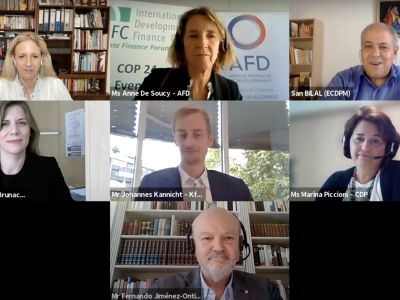
5 take-aways from the OECD Global Forum on Development
The Global Forum on Development hosted last week by the Organization for Economic Cooperation and Development discussed how sustained and inclusive growth could be achieved in development, despite structural development challenges and lagging productivity.
One of the main problems identified was the non-convergence of many middle-income countries expected to reach OECD income levels by 2050, due to growth stagnation in emerging economies and decreasing external demand. Overall low productivity levels in low- and middle-income countries — which are responsible for non-convergence with advanced economies — ultimately increase the danger of countries facing the middle-income trap.
There were five key points to take away from the discussions in Paris:
1. Innovation and beyond. Innovation does not only relate to research and development, expenditure or technology, but also to innovative approaches to development, as well as partnerships, actors and coherent policies. This should trigger a broad-based impetus to development and productivity.
2. More growth. Massive growth is required to provide decent jobs, which are at the same time inclusive and sustainable. To keep up with the current demographic pace, in Africa alone 12 million new jobs are needed annually. To achieve inclusive growth and development, productivity improvements, value-add, diversification and structural change are crucial. These can be achieved through innovation, scale and strategies.
3. Private sector involvement. Conversations need to move away from talking about the private sector for development, towards talking with the private sector for development. This necessitates a convergence in language and incentives.
4. New partnerships. In order to create an effective enabling environment within institutions, all actors need to take responsibility — including both public and private institutions — in order to achieve inclusive development cooperation.
5. Beyond aid towards diverse sources of finance. The role of official development assistance has changed and needs to adapt. Aid must be recognized as a valuable means to support private finance and boost private investments. The role of domestic resource mobilization will be of particular importance here in supporting developing countries’ own domestic development agendas.
With those five messages in mind, institutions and policies matter most for overcoming structural challenges. An effective industrial policy, and some further thought into how policies relate to integration in global value chains and productivity increases, are essential problems to be tackled moving forward. Given the current discussions on a new post-2015 development framework, it seems clear that for the five messages to be effective, institutions for effective industrial policy will somehow have to figure them into the new framework.
The three-year OECD Global Forum on Development series, which began in 2013, is dealing with the new post-2015 development agenda as a follow-up framework to the Millennium Development Goals and has been clustered around three dimensions: 2013 as about Innovative approaches to poverty reduction, social cohesion and well-being; 2014 focused on innovating for development and rethinking structural challenges; and 2015 will tackle the financing challenge, especially investment and taxation in a post-2015 context.
The OECD’s “Perspectives on Global Development 2014” launched at this year’s edition argue that developing economies continue to grow faster than more advanced countries, but that per capita incomes in developing countries — including many MICs — will not reach the levels of developed countries by 2050. So although developing countries still grow faster than the more advanced ones, they are still not growing fast enough to catch up with OECD levels given their fast population increase. This may make the middle-income trap — a buzz topic at this recently concluded OECD Development Week — more likely to take effect.
Boosting productivity growth in low- and middle-income countries could address this challenge. However, essential to this will be the effective implementation of some or all of the issues pointed to above. Real change will require broad political commitment, ownership and the clear identification of binding constraints as to why it has not happened in the past.
Discussions around the new post-2015 development framework, as the OECD Forum has demonstrated, are certainly useful in drawing attention to these issues and creating a change in mindset. A follow-up to these fora, however — one that targets the implementation phase — is needed to avoid a situation where, despite the agreements and discussions, there is no real change.
---


